Charles E W Bean, Diaries, AWM38 3DRL 606/247/1 - 1917 - 1933 - Part 12
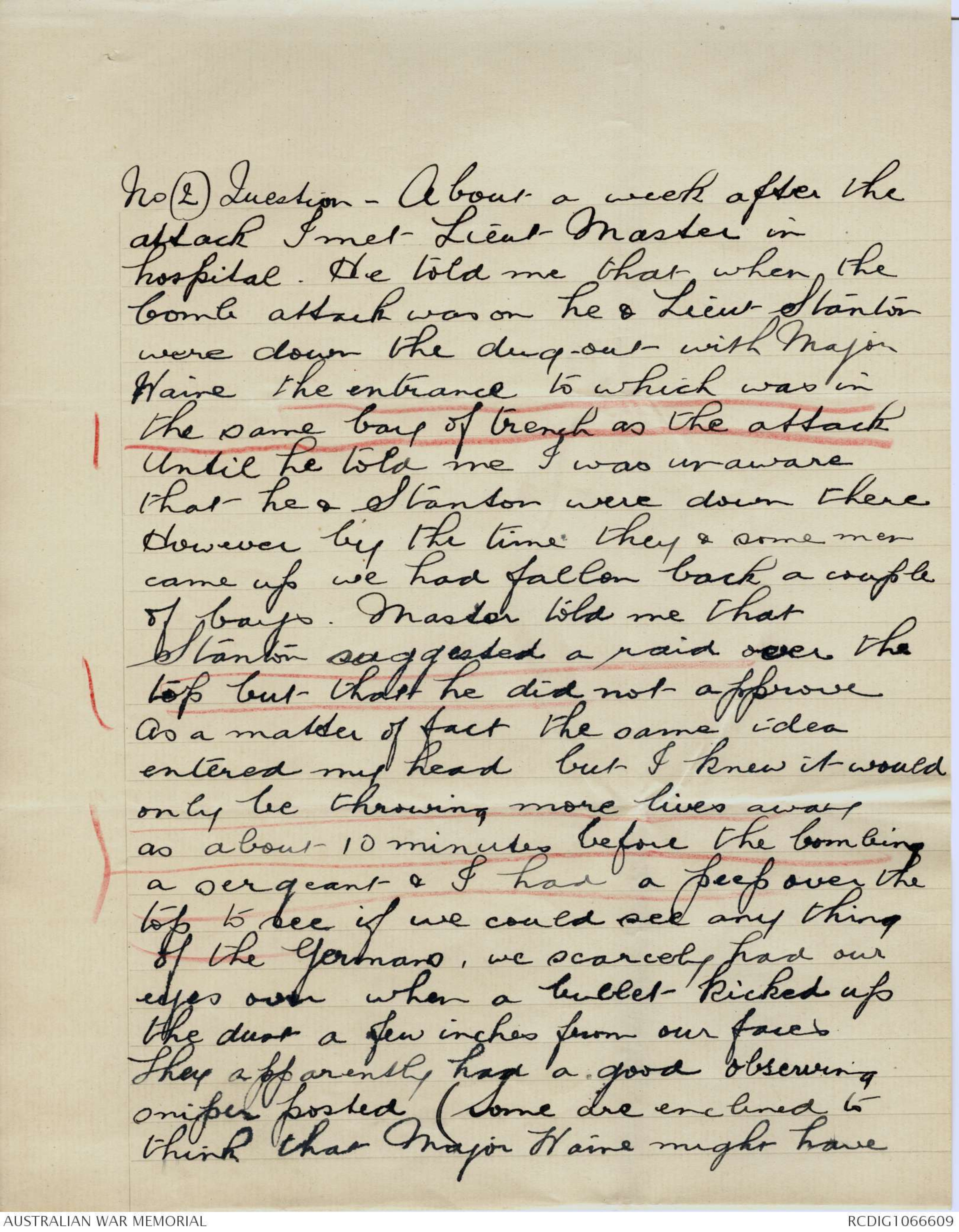
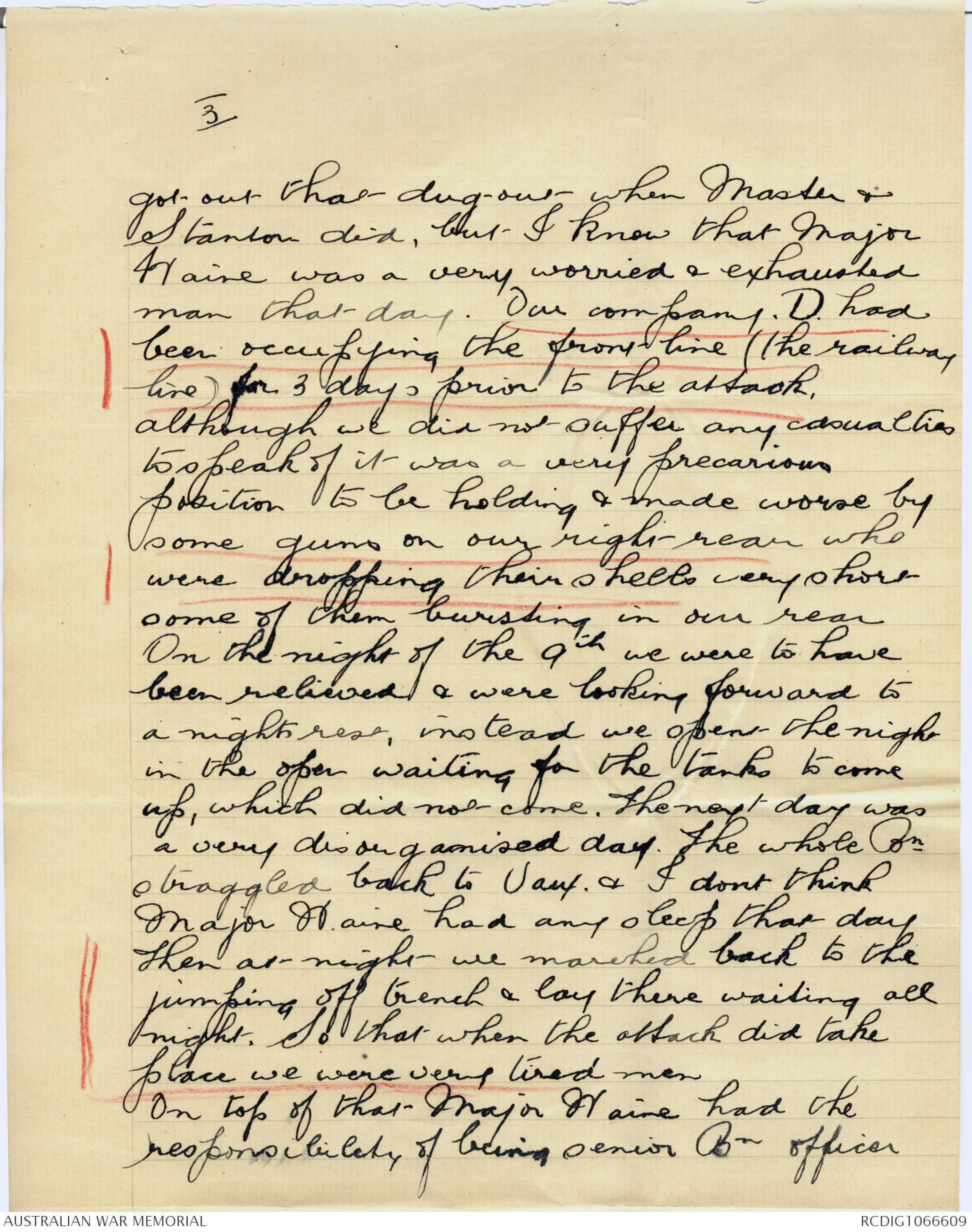
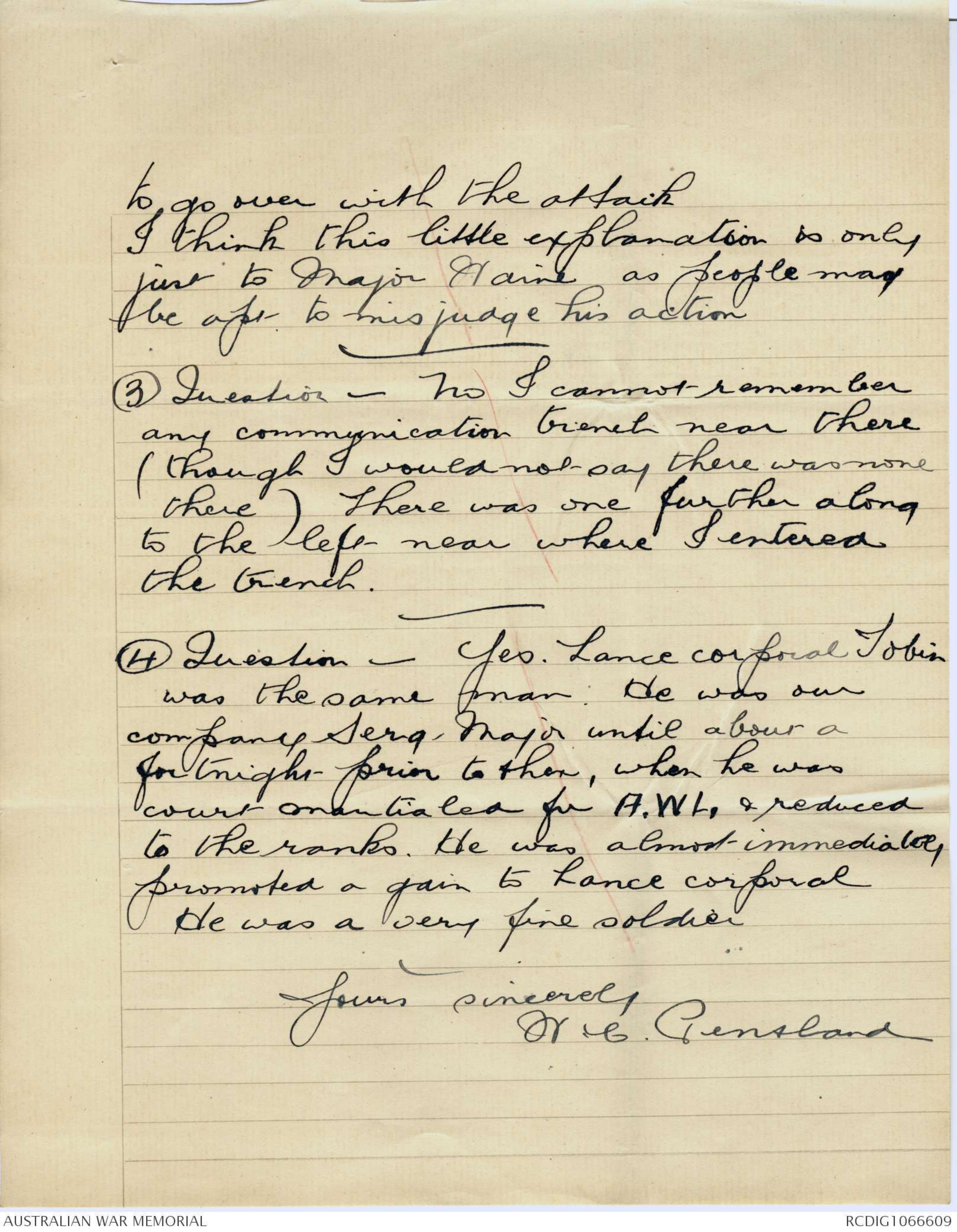
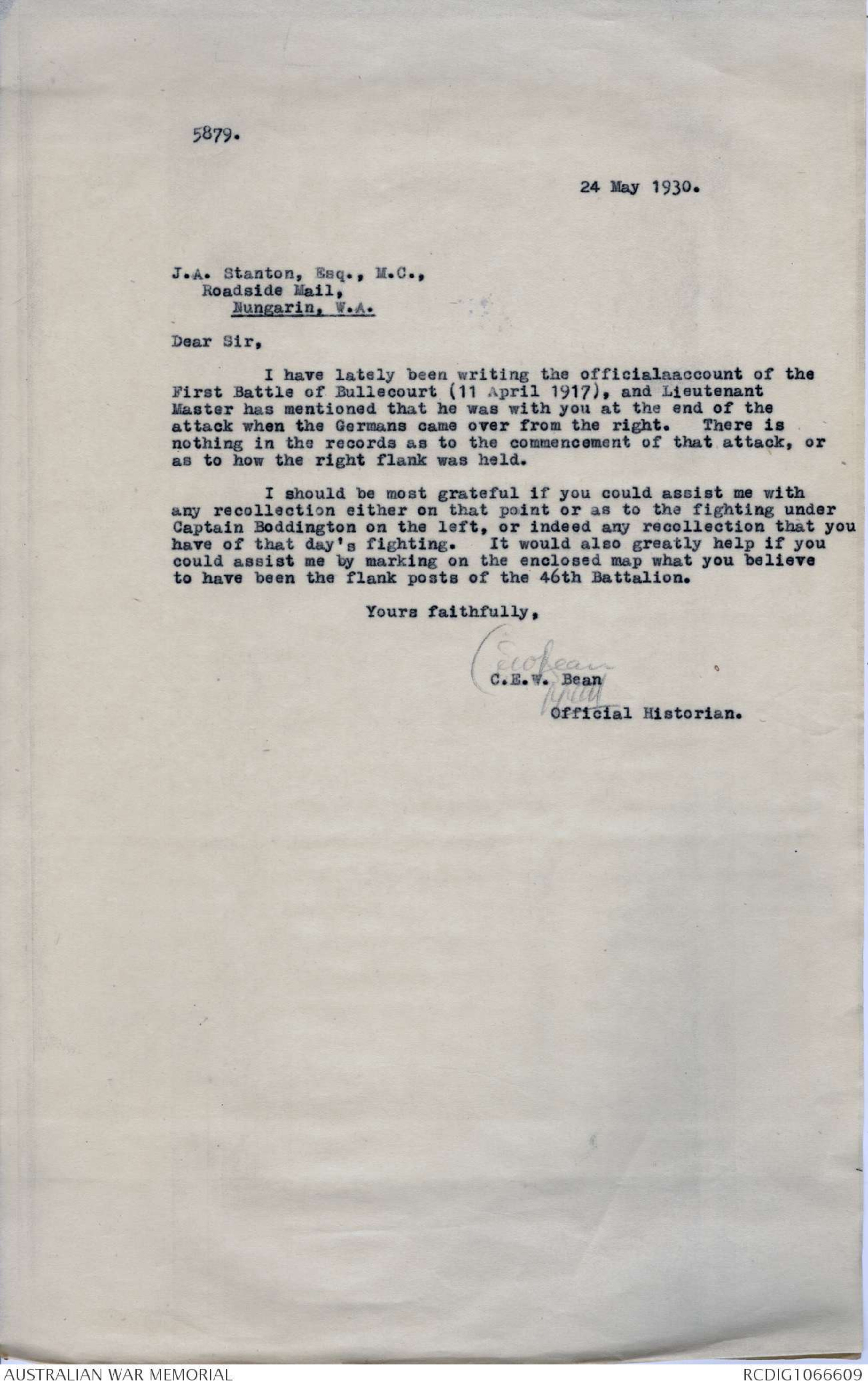
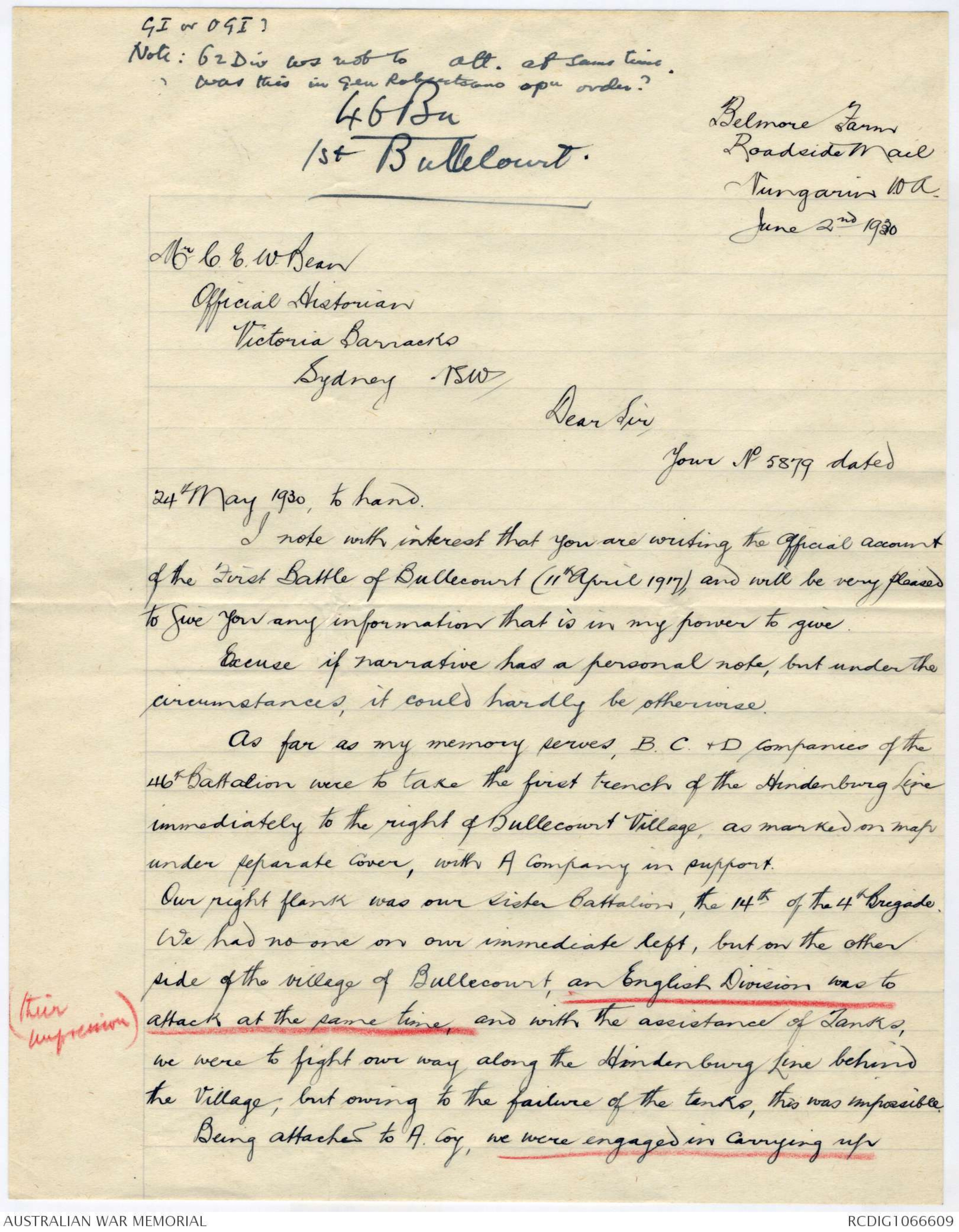
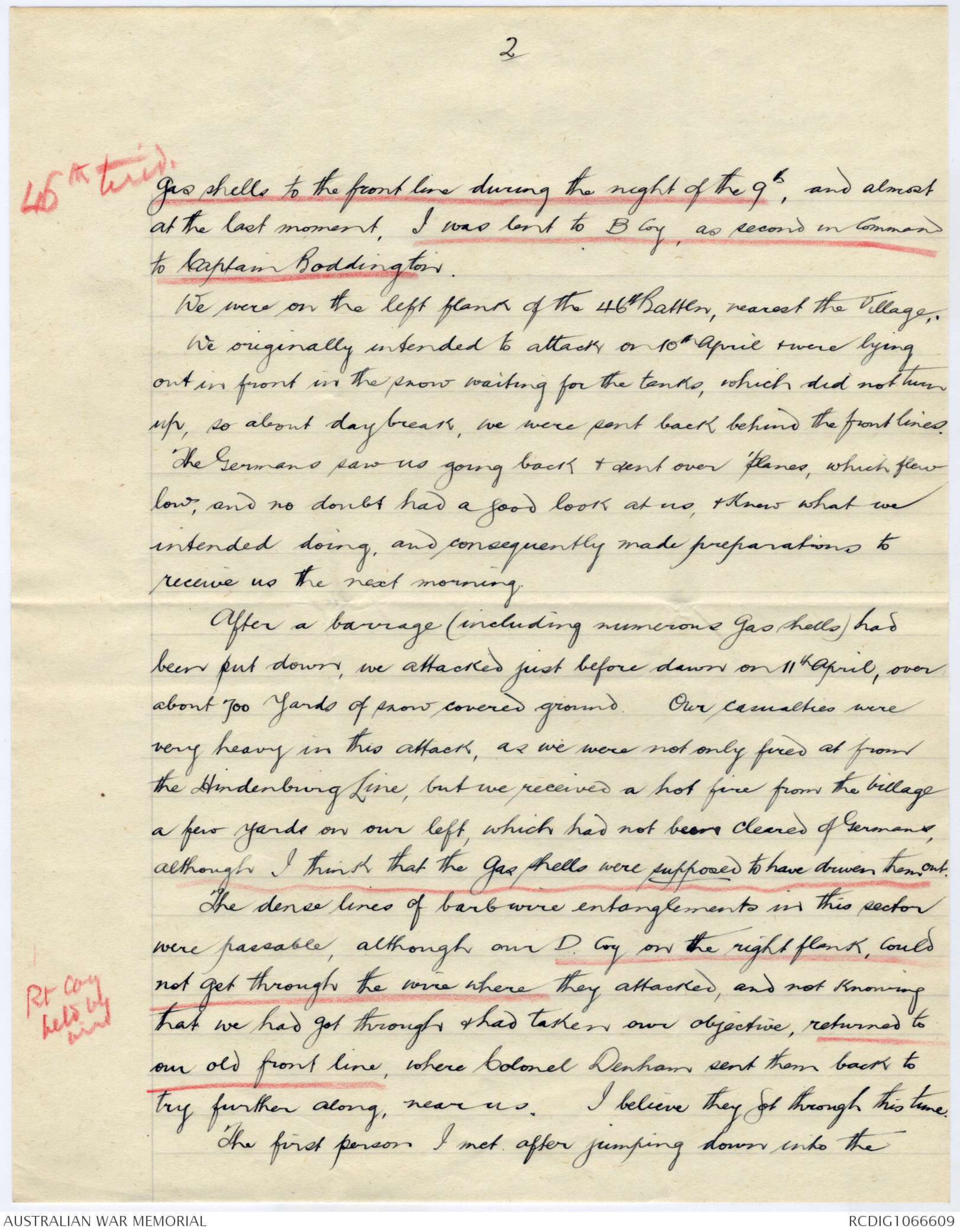
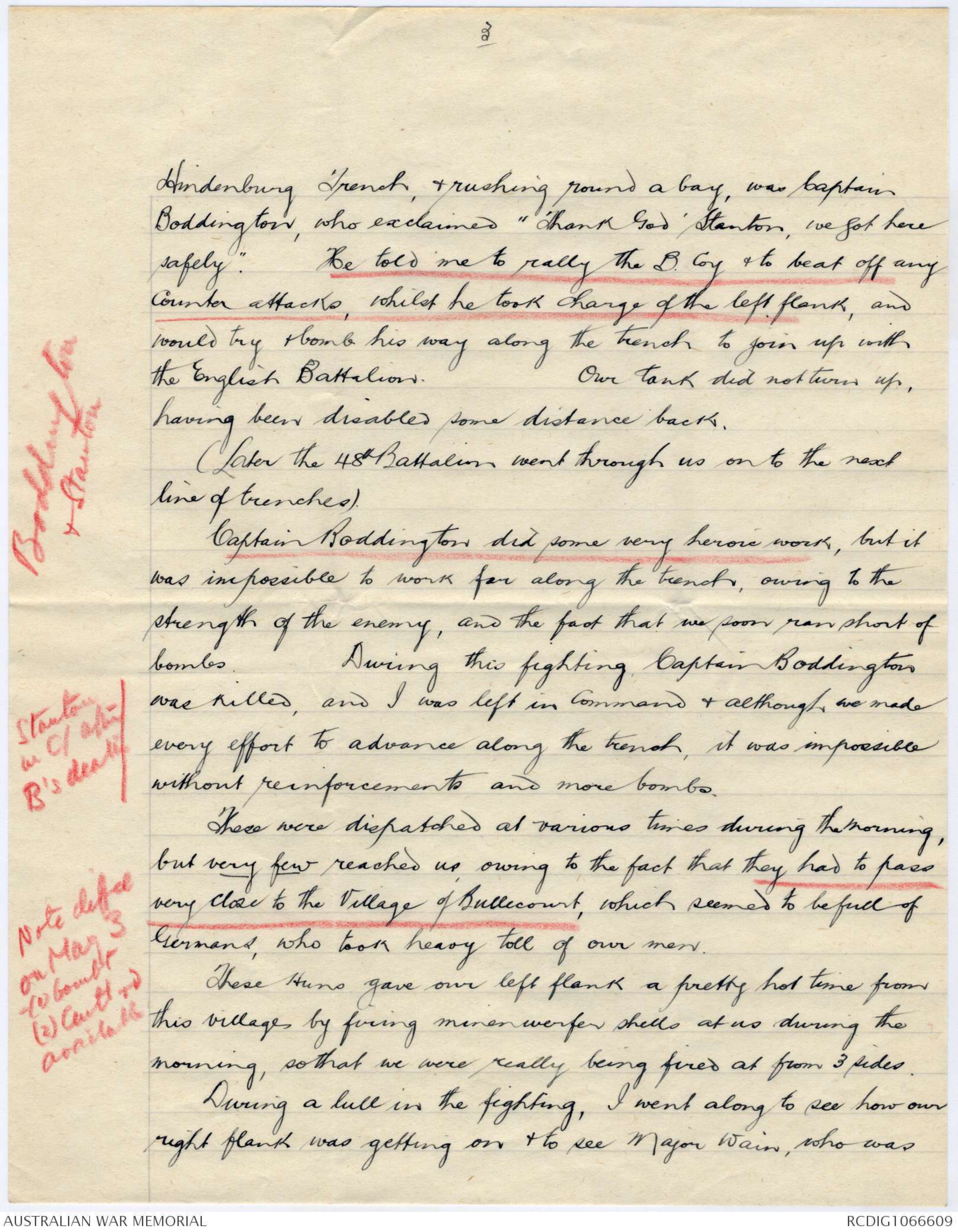

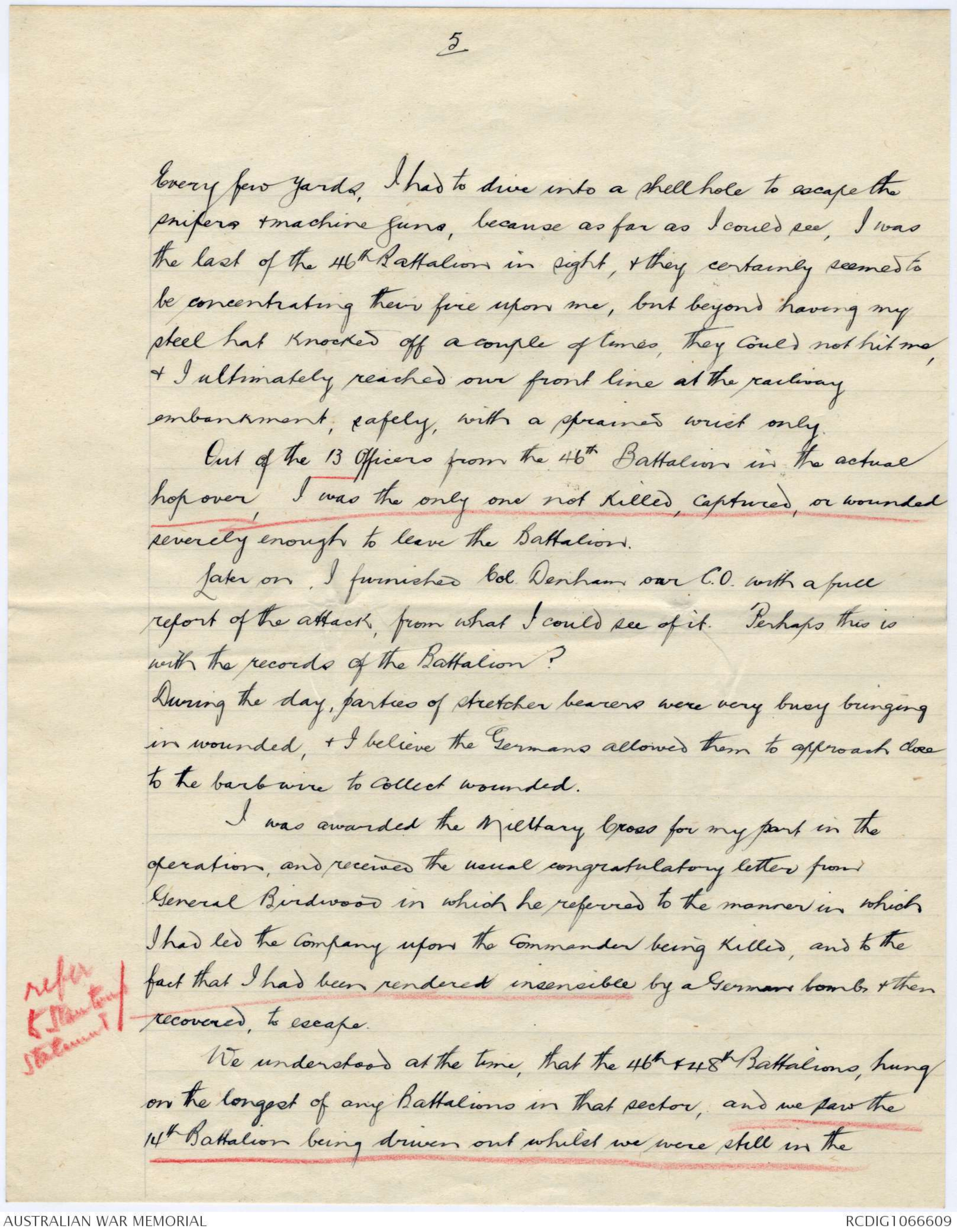
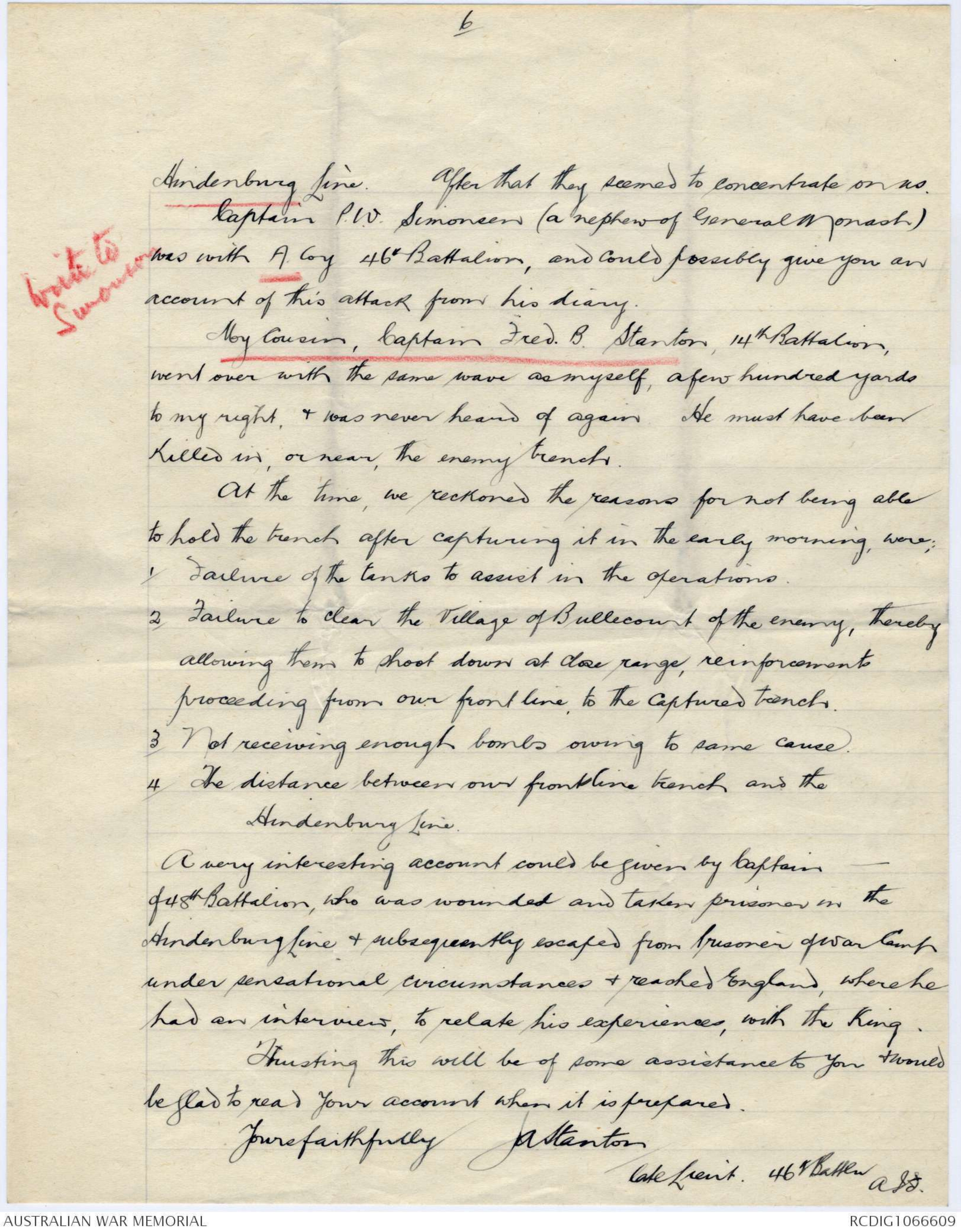
No. (2) Question - About a week after the
attack I met Lieut Master in
hospital. He told me that when the
bomb attack was on he & Lieut Stanton
were down the dug-out with Major
Waine the entrance to which was in
the same bay of trench as the attack
Until he told me I was unaware
that he & Stanton were down there.
However by the time they & some men
came up we had fallen back a couple
of bays. Master told me that
Stanton suggested a raid over the
top but that he did not approve.
As a matter of fact the same idea
entered my head but I knew it would
only be throwing more lives away
as about 10 minutes before the bombing
a sergeant & I had a peep over the
top to see if we could see any thing
of the Germans, we scarcely had our
eyes over when a bullet kicked up
the dust a few inches from our faces.
They apparently had a good observing
sniper posted (Some are enclined to
think that Major Waine might have
3
got out that dug-out when Master &
Stanton did, but I knew that Major
Waine was a very worried & exhausted
man that day. Our company. D. had
been occupying the front line (the railway
line) for 3 days, prior to the attack,
although we did not suffer any casualties
to speak of it was a very precarious
position to be holding & made worse by
some guns on our right rear who
were dropping their shells very short
some of them bursting in our rear
On the night of the 9th we were to have
been relieved & were looking forward to
a nights rest, instead we spent the night
in the open waiting for the tanks to come
up, which did not come. The next day was
a very disorganised day. The whole Bn
straggled back to Vaux. & I dont think
Major Waine had any sleep that day
Then at night we marched back to the
jumping off trench & lay there waiting all
night. So that when the attack did take
place we were very tired men
On top of that Major Waine had the
responsibility of being senior Bn officer
to go over with the attack
I think this little explanation is only
just to Major Waine as people may
be apt to misjudge his action.
(3) Question - No I cannot remember
any communication trench near there
(though I would not say there was none
there) There was one further along
to the left near where I entered
the trench.
(4) Question - Yes. Lance corporal Tobin
was the same man. He was our
company Serg. Major until about a
fortnight prior to then, when he was
court martialed for A.W.L, & reduced
to the ranks. He was almost immediately
promoted again to Lance corporal
He was a very fine soldier
Yours sincerely
W. C. Pentland
5879.
24 May 1930.
J. A. Stanton, Esq., M. C.,
Roadside Mail,
Nungarin, W.A.
Dear Sir,
I have lately been writing the officialaaccount of the
First Battle of Bullecourt (11 April 1917), and Lieutenant
Master has mentioned that he was with you at the end of the
attack when the Germans came over from the right. There is
nothing in the records as to the commencement of that attack, or
as to how the right flank was held.
I should be most grateful if you could assist me with
any recollection either on that point or as to the fighting under
Captain Boddington on the left, or indeed any recollection that you
have of that day's fighting. It would also greatly help if you
could assist me by marking on the enclosed map what you believe
to have been the flank posts of the 46th Battalion.
Yours faithfully
CEW Bean
C.E.W. Bean
[[?]]
Official Historian
[*GI or OGI )
Note: 62 Div ws not to att. at same time.
was this in Gen Robertsons opn order?*]
46 Bn
1st Bullecourt
Belmore Farm
Roadside Mail,
Nungarin W.A.
June 2nd 1930
Mr C. E. W. Bean
Official Historian
Victoria Barracks
Sydney NSW
Dear Sir
Your No 5879 dated
24th May 1930, to hand.
I note with interest that you are writing the Official account
of the First Battle of Bullecourt (11th April 1917), and will be very pleased
to give you any information that is in my power to give.
Excuse if narrative has a personal note, but under the
circumstances, it could hardly be otherwise.
As far as my memory serves, B. C, & D Companies of the
46th Battalion were to take the first trench of the Hindenburg Line
immediately to the right of Bullecourt Village, as marked on map
under separate cover, with A Company in support.
Our right flank was our sister Battalion, the 14th of the 4th Brigade.
We had no one on our immediate left, but on the other
side of the village of Bullecourt, an English Division was to
[*their impression*] attack at the same time, and with the assistance of Tanks,
we were to fight our way along the Hindenburg Line behind
the Village, but owing to the failure of the tanks, this was impossible.
Being attached to A. Coy, we were engaged in carrying up
2
[*46th tired.*]
gas shells to the front line during the night of the 9th, and almost
at the last moment, I was lent to B Coy, as second in Command
to Captain Boddington.
We were on the left flank of the 46th Battln, nearest the Village,.
We originally intended to attack on 10th April & were lying
out in front in the snow waiting for the tanks, which did not turn
up, so about daybreak, we were sent back behind the front lines.
The Germans saw us going back & sent over 'planes, which flew
low, and no doubt had a good look at us, & knew what we
intended doing, and consequently made preparations to
receive us the next morning
After a barrage (including numerous Gas shells) had
been put down, we attacked just before dawn on 11th April, over
about 700 yards of snow covered ground. Our casualties were
very heavy in this attack, as we were not only fired at from
the Hindenburg Line, but we received a hot fire from the village
a few yards on our left, which had not been cleared of Germans,
although I think that the gas shells were supposed to have driven
them out.
The dense lines of barb wire entanglements in this sector
were passable, although our D. Coy on the right flank, could
[*Rt Coy held by wire*] not get through the wire where they attacked, and not knowing
that we had got through & had taken our objective, returned to
our old front line, where Colonel Denham sent them back to
try further along near us. I believe they got through this time
The first person I met after jumping down into the
3
Hindenburg Trench, & rushing round a bay, was Captain
Boddington, who exclaimed "Thank God Stanton, we got here
safely". He told me to rally the B. Coy & to beat off any
Counter attacks, whilst he took charge of the left flank, and
[*Boddington & Stanton*]
would try & bomb his way along the trench to join up with
the English Battalion. Our tank did not turn up,
having been disabled some distance back.
(Later the 48th Battalion went through us on to the next
line of trenches).
Captain Boddington did some very heroic work, but it
was impossible to work far along the trench, owing to the
strength of the enemy, and the fact that we soon ran short of
bombs. During this fighting Captain Boddington
was killed, and I was left in command & although we made
every effort to advance along the trench, it was impossible
without reinforcements and more bombs.
[*Stanton in c/ after B's death*]
These were dispatched at various times during the morning,
but very few reached us owing to the fact they had to pass
very close to the village of Bullecourt, which seemed to be full of
Germans, who took heavy toll of our men.
[*Note diffcl on May 3 (1) bombt (2) Centl rd available*]
These Huns gave our left flank a pretty hot time from
this village by firing minenwerfer shells at us during the
morning, so that we were really being fired at from 3 sides.
During a lull in the fighting, I went along to see how our
right flank was getting on & to see Major Wain, who was
4
in charge of our Battalion's hop over.
There was no sign of the 14th Battalion linking up with
us, & I do not know how far away they were.
[*Reason for failure to bomb to rt*]
Our right flank had blocked up the trench to prevent an
attack from that quarter and were probably not strong enough
to attack along the trench towards the 14th Battln, and some of the
Officers & men were resting down a dug out, probably temporary
Battalions Hqrs. I was invited down, but decided that I
would get back to the left flank again. Some time later,
the enemy came over and attacked the right flank & took prisoners
some of those down this dug out.
[*deep trenches*]
The remainder were gradually forced back on to us, and after a
strenuous resistance, considering the shortage of bombs, the
trenches being too deep for much sniping, we were gradually
forced back along the trench. Whilst organising a counter-attack,
we were heavily bombed by the advancing enemy, & I
was rendered unconsious, & upon recovering, found that our
men were returning across no mans land towards our front line.
[*Stanton's escape*]
It was either that, or be captured. This was about 11.30 am.
On looking towards the advancing Germans, I found that they
were in the next bay, so I quickly slid over the parapet & dived
into a shellhole. Private Davidson saw the dive & reported me
as being shot. After a short wait, I decided to try
my luck & made a dash for the wire entanglements, hoping
that I might get through and across no man's land.
5
Every few yards, I had to dive into a shellhole to escape the
snipers & machine guns, because as far as I could see, I was
the last of the 46th Battalion in sight, & they certainly seemed to
be concentrating their fire upon me, but beyond having my
steel hat knocked off a couple of times, they could not hit me,
& I ultimately reached our front line at the railway
embankment, safely, with a sprained wrist only.
Out of the 13 Officers from the 46th Battalion in the actual
hop over, I was the only one not killed, captured, or wounded
severely enough to leave the Battalion.
Later on, I furnished Col Denham our C.O. with a full
report of the attack, from what I could see of it. Perhaps this is
with the records of the Battalion?
During the day, parties of stretcher bearers were very busy bringing
in wounded, & I believe the Germans allowed them to approach close
to the barb wire to collect wounded.
I was awarded the Military Cross for my part in the
operation, and received the usual congratulatory letter from
General Birdwood in which he referred to the manner in which
I had led the company upon the commander being killed, and to the
fact that I had been rendered insensible by a German bomb, & then recovered, to escape.
[*refer to Stantons statement*]
We understood at the time, that the 46th& 48th Battalions, hung
on the longest of any Battalion in that sector, and we saw the
14th Battalion being driven out whilst we were still in the
6
Hindenburg Line. After that they seemed to concentrate on us.
Captain P. W. Simonsen (a nephew of General Monash)
was with A. Coy 46th Battalion, and could possibly give you an
account of this attack from his diary.
[*Write to Simonsen*]
My cousin, Captain Fred. B. Stanton, 14th Battalion,
went over with the same wave as myself, a few hundred yards
to my right, & was never heard of again. He must have been
killed in, or near, the enemy trench.
At the time, we reckoned the reasons for not being able
to hold the trench after capturing it in the early morning, were;
1/ Failure of the tanks to assist in the operations.
2/ Failure to clear the Village of Bullecourt of the enemy, thereby
allowing them to shoot down at close range, reinforcements
proceeding from our front line to the captured trench.
3/ Not receiving enough bombs owing to same cause.
4/ The distance between our frontline trench and the
Hindenburg Line.
A very interesting account could be given by Captain -
of 48thBattalion, who was wounded and taken prisoner in the
Hindenburg Line & subsequently escaped from Prisoner of War Camp
under sensational circumstances & reached England, where he
had an interview, to relate his experiences, with the King.
Trusting this will be of some assistance to you & would
be glad to read your account when it is prepared.
Yours faithfully J.A. Stanton
late Lieut. 46th Battln AIF.
 Arlene Baade
Arlene BaadeThis transcription item is now locked to you for editing. To release the lock either Save your changes or Cancel.
This lock will be automatically released after 60 minutes of inactivity.